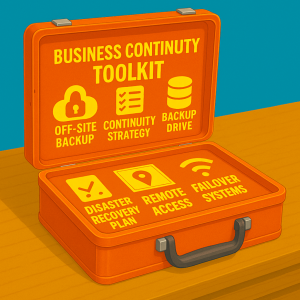April 5, 2025
As a Managed Service Provider (MSP) based in Cannock, Staffordshire, we understand the unique challenges faced by Small Businesses. With the upcoming end of life (EOL) for Windows 10 on the horizon, it's crucial to prepare your business for the transition to avoid potential compliance and security issues.
Understanding the End of Life of Windows 10
Windows 10 has been a reliable operating system for many businesses. However, Microsoft has announced that Windows 10 will reach its end of life on October 14, 2025. This means that Microsoft will no longer provide security updates, patches, or technical support for Windows 10, leaving your systems vulnerable to cyber threats.
Windows 11 is only compatible with certain hardware, so you may need to budget for potential replacements if you're currently using older hardware.The main requirement is something called TPM, which stands for Trusted Platform Module.Most computers from around 2019 have these modules so you may be ok.There is a free tool from Microsoft that you can run on your PC here.
Why Upgrading is Crucial
The end of life of Windows 10 poses significant risks for businesses that continue to use the operating system. Without regular security updates, your systems become an easy target for cybercriminals, putting sensitive data and projects at risk. Furthermore, continuing to use outdated software can lead to compliance issues, particularly with standards such as Cyber Essentials.
Cyber Essentials Compliance
Cyber Essentials is a government-backed scheme designed to help businesses protect themselves against common cyber threats. One of the key requirements of Cyber Essentials is to use supported and up-to-date software. Continuing to use Windows 10 after its end of life would mean failing to meet this requirement, potentially resulting in non-compliance.
Non-compliance with Cyber Essentials can have serious implications, including:
·Increased vulnerability to cyber-attacks
·Potential fines and penalties
·Damage to your reputation and loss of client trust
Steps to Prepare for the Transition
To ensure a smooth transition and maintain compliance with Cyber Essentials, here are some essential steps your firm should take:
1. Assess Your Current Systems: Conduct a thorough assessment of your current IT infrastructure to identify systems running Windows 10. This will help you plan the scope of the upgrade.
2. Plan the Upgrade: Develop a detailed plan for upgrading to a supported operating system, such as Windows 11. Consider the compatibility of your current software and applications with the new OS.
3. Budget for the Upgrade: Allocate a budget for the upgrade process, including software licenses, potential hardware upgrades, and any additional IT support required.
4. Test the New System: Before fully deploying the new operating system, conduct thorough testing to ensure compatibility and functionality with your existing tools and workflows.
5. Train Your Team: Provide training for your employees to familiarize them with the new operating system and any changes in processes or tools.
6. Monitor and Maintain: After the upgrade, continuously monitor your systems and ensure they are regularly updated to stay compliant with Cyber Essentials and other relevant standards.
How We Can Help
As a trusted MSP in Cannock, Staffordshire, we specialize in supporting small business. Our team of experts can assist you with the entire transition process, from initial assessment and planning to implementation and ongoing support. We understand your specific needs and are committed to ensuring your business remains secure and compliant.
Conclusion
The end of life of Windows 10 is approaching, and it's essential for businesses to prepare for the transition. By upgrading to a supported operating system and maintaining compliance with Cyber Essentials, you can protect your sensitive data, avoid potential fines, and maintain client trust. Contact us today to learn how we can help you navigate this important transition seamlessly.
Business Interrupted: The Unexpected Disaster Your IT Provider Should Be Planning For
Why Your Business Shouldn’t Delay Getting a Password Manager



